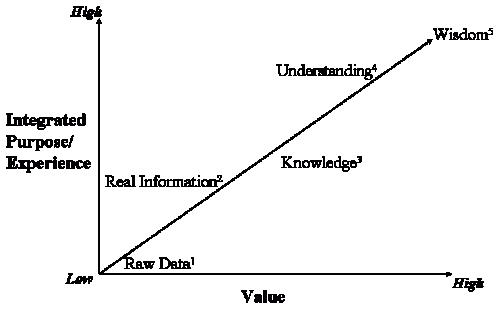In many communities debates on issues often focus on differences in available data or information. Unfortunately, evaluating data is only the first step toward developing the collective wisdom needed to make good choices and implement positive change. In Nadler and Chandon’s book “Smart Questions”, the authors describe the data-to-wisdom continuum as follows:
- Raw Data- Information whose validity depends on the methods of collection and context.
- Real Information- Compiled and contextualized raw data.
- Knowledge- Interpretation, experience, history, and additional context (such as purpose) added to compiled information.
- Understanding – Broad insight about how knowledge fits into the big picture and how it might be used or integrated by others.
- Wisdom – The ability to transform understanding into concrete action, particularly as circumstances change.
Too often questions that would move groups from data-to-wisdom aren’t asked. To help move citizens up the continuum you can invite them to consider questions like the following: how was the data collected? who collected it and why? what was the context in which it was collected and first presented and how does that differ from the current context? what other information do we know, or don’t we know that would help inform our understanding or purpose? how do the conclusions presented align with your experience? or your values? Promoting dialogue around these kinds of questions can minimize, or even eliminate, partisan debate.


Pingback: Planning to Engage – Shoreline | The Blog for Building Dialogue
Pingback: Accountability and Context | The Blog for Building Dialogue
Pingback: Navigating Our Blog | The Blog for Building Dialogue
Pingback: Working Through Cognitive Errors – A Review | The Blog for Building Dialogue
Pingback: ABA Mediation Week 2013 – Looking Back At Resolution 108 | The Blog for Building Dialogue
Pingback: ABA Mediation Week 2013 – Civility Is Not Enough | The Blog for Building Dialogue
Pingback: Teaching The Navigation of Difficult Dialogues: Sequence -1 | The Blog for Building Dialogue
Pingback: Hate, Terror, and The Power To Heal | The Blog for Building Dialogue
Pingback: Back on Track | The Blog for Building Dialogue
Pingback: TRUST: How It Develops | The Blog for Building Dialogue
Pingback: TRUST: 10 Things That Erode Trust – Part 2 | The Blog for Building Dialogue
Pingback: Weeding and Watching Part 2 | The Blog for Building Dialogue
Pingback: Harvesting (From A Midwest Metaphor) | The Blog for Building Dialogue